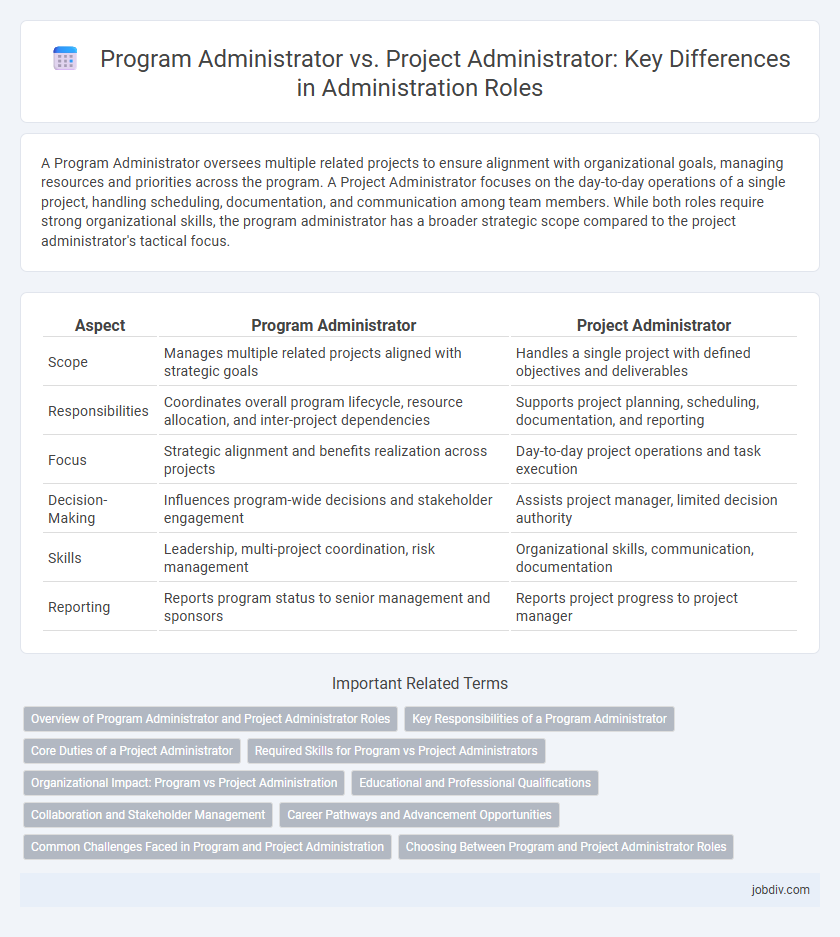A Program Administrator oversees multiple related projects to ensure alignment with organizational goals, managing resources and priorities across the program. A Project Administrator focuses on the day-to-day operations of a single project, handling scheduling, documentation, and communication among team members. While both roles require strong organizational skills, the program administrator has a broader strategic scope compared to the project administrator's tactical focus.
Table of Comparison
| Aspect | Program Administrator | Project Administrator |
|---|---|---|
| Scope | Manages multiple related projects aligned with strategic goals | Handles a single project with defined objectives and deliverables |
| Responsibilities | Coordinates overall program lifecycle, resource allocation, and inter-project dependencies | Supports project planning, scheduling, documentation, and reporting |
| Focus | Strategic alignment and benefits realization across projects | Day-to-day project operations and task execution |
| Decision-Making | Influences program-wide decisions and stakeholder engagement | Assists project manager, limited decision authority |
| Skills | Leadership, multi-project coordination, risk management | Organizational skills, communication, documentation |
| Reporting | Reports program status to senior management and sponsors | Reports project progress to project manager |
Overview of Program Administrator and Project Administrator Roles
Program Administrators oversee multiple related projects, ensuring alignment with organizational goals, strategic planning, and resource allocation across the program lifecycle. Project Administrators focus on managing individual project tasks, schedules, budgets, and communication among stakeholders to meet specific project objectives. Both roles require strong organizational skills, but Program Administrators operate at a higher strategic level, while Project Administrators handle day-to-day project execution.
Key Responsibilities of a Program Administrator
A Program Administrator oversees multiple interrelated projects, ensuring alignment with organizational goals, managing resources, and maintaining stakeholder communication across the program lifecycle. They are responsible for strategic planning, risk management, and performance monitoring to guarantee program success and delivery within budget and timelines. Their role includes coordinating project administrators, facilitating collaboration, and implementing governance frameworks to optimize program outcomes.
Core Duties of a Project Administrator
A Project Administrator manages day-to-day project operations, including resource allocation, schedule tracking, and stakeholder communication, ensuring projects meet deadlines and budgets. They coordinate with cross-functional teams to maintain project documentation, monitor progress, and facilitate issue resolution. Core duties emphasize operational execution within project management frameworks, distinct from broader program oversight handled by Program Administrators.
Required Skills for Program vs Project Administrators
Program Administrators require advanced organizational skills, strategic planning capabilities, and expertise in resource allocation to manage multiple related projects effectively. Project Administrators need strong time management, task coordination, and detailed documentation skills to ensure individual project milestones are met on schedule. Both roles demand excellent communication and problem-solving abilities, but Program Administrators must excel in leadership and cross-project integration, while Project Administrators focus on executing specific project plans.
Organizational Impact: Program vs Project Administration
Program Administrators oversee multiple related projects, aligning them with strategic organizational goals to maximize overall impact and resource efficiency. Project Administrators focus on individual project execution, ensuring timely delivery and adherence to specific objectives within the project scope. The organizational impact of program administration is broader, driving cross-project coordination and long-term value, while project administration enhances operational effectiveness on a task-specific level.
Educational and Professional Qualifications
Program Administrators typically hold advanced degrees such as a master's in education, business administration, or public policy, paired with extensive experience in managing multiple related projects and strategic planning. Project Administrators often possess a bachelor's degree in fields like business, management, or a related discipline, supplemented by certifications such as PMP or CAPM to efficiently oversee individual projects. Both roles demand strong organizational skills, but Program Administrators require broader leadership abilities and a deeper understanding of program-level goals and resource integration.
Collaboration and Stakeholder Management
Program Administrators coordinate multiple related projects to ensure alignment with strategic objectives, facilitating collaboration among diverse project teams and stakeholders at different levels. Project Administrators focus on the day-to-day coordination of individual projects, managing communication and expectations between project team members and specific stakeholders. Effective stakeholder management requires Program Administrators to maintain a high-level overview and integrate feedback across projects, while Project Administrators concentrate on direct, detailed interactions to address immediate issues and progress.
Career Pathways and Advancement Opportunities
Program Administrators typically oversee multiple related projects, managing larger scopes and coordinating resources across teams, which positions them for advancement into senior management roles such as Program Director or Portfolio Manager. Project Administrators focus on the execution of specific projects, developing skills in project planning, budgeting, and stakeholder communication, which can lead to roles such as Project Manager or Project Coordinator. Career pathways for both roles emphasize leadership development, with Program Administrators often progressing towards strategic oversight positions, while Project Administrators advance through specialized project management certifications and expanded operational responsibilities.
Common Challenges Faced in Program and Project Administration
Program administrators and project administrators both face the challenge of managing limited resources while balancing multiple priorities to meet deadlines. Coordinating communication among diverse stakeholders and ensuring alignment with strategic goals frequently causes delays and misunderstandings. Handling scope changes and maintaining accurate documentation are persistent issues that impact the successful delivery of programs and projects.
Choosing Between Program and Project Administrator Roles
Choosing between a Program Administrator and a Project Administrator hinges on the scope and complexity of responsibilities; Program Administrators manage multiple related projects aligning with strategic business goals, while Project Administrators focus on overseeing specific project tasks and deliverables within set timelines. Skill sets vary, with Program Administrators requiring expertise in cross-project coordination, budget oversight, and stakeholder communication, whereas Project Administrators excel in task scheduling, resource allocation, and risk management for individual projects. Organizations seeking holistic program oversight prioritize Program Administrators, while firms needing detailed attention on singular projects prefer Project Administrators.
Program Administrator vs Project Administrator Infographic

 jobdiv.com
jobdiv.com